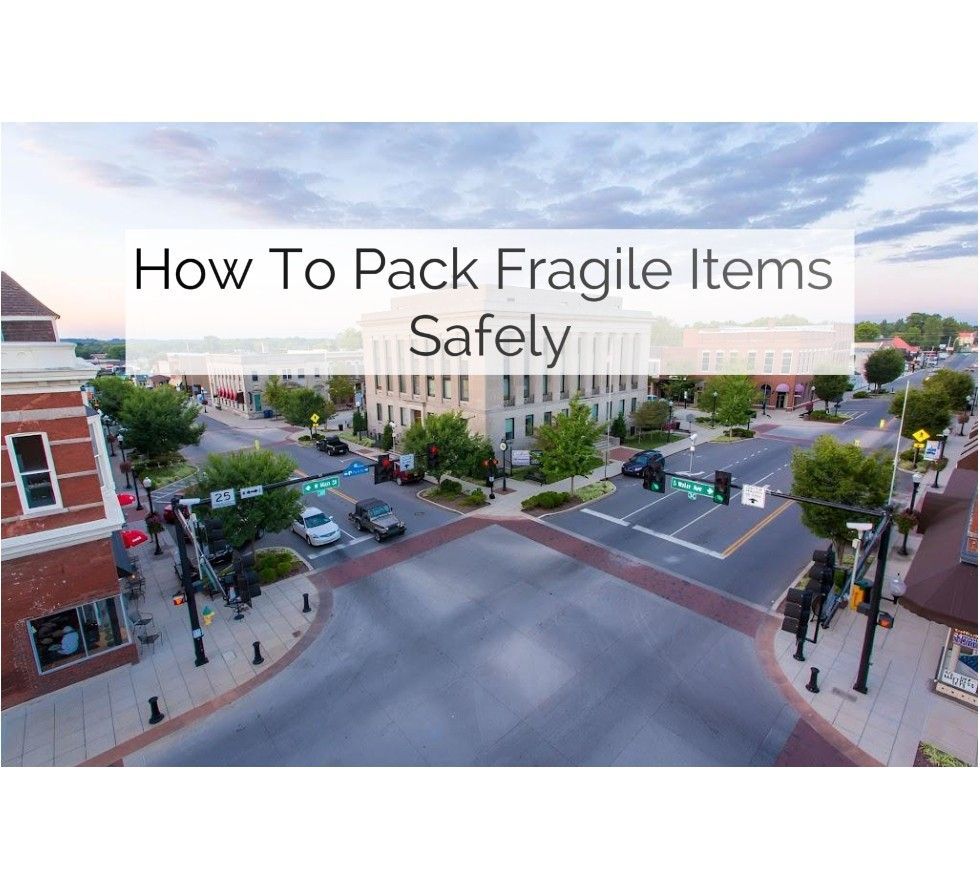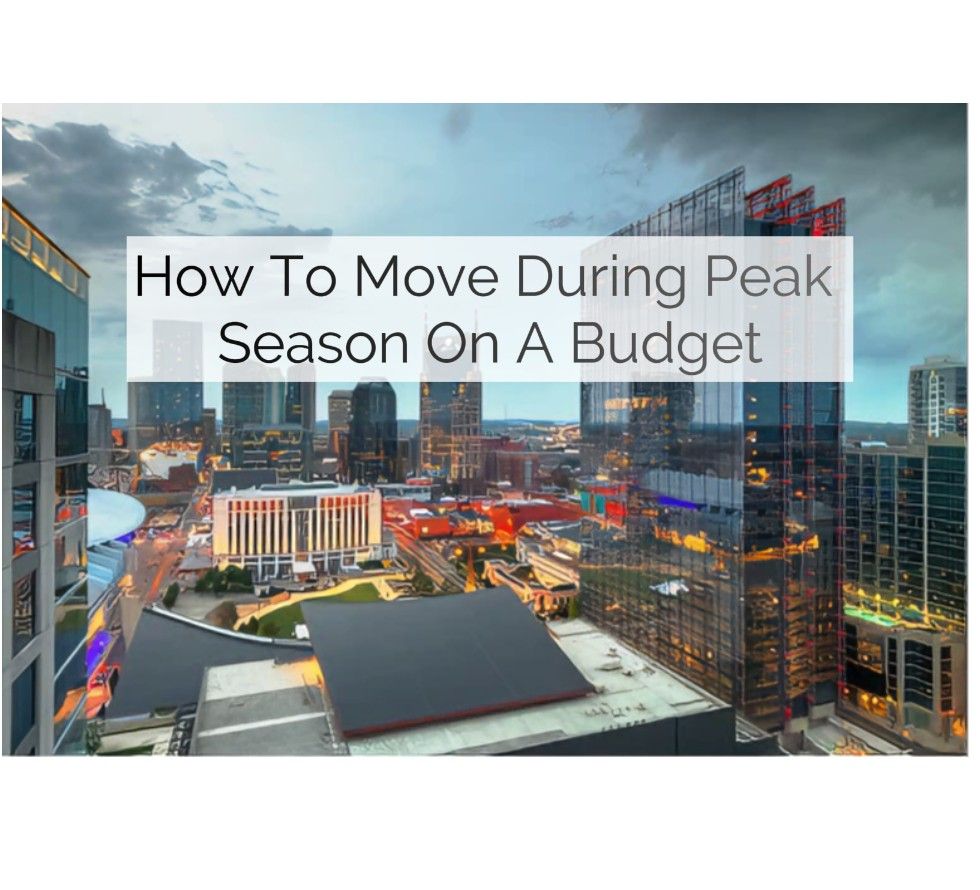What Are the Things To Consider When Moving to A New City?
nick • August 21, 2023
Moving to a new city can be an exhilarating adventure, promising new opportunities, experiences, and challenges. Whether you're moving for a job, family, or simply a change of scenery, there are numerous factors to consider. This guide provides a comprehensive overview of the key considerations when making such a move.
Every year, millions of people decide to move to a new city. The allure of new experiences, cultures, and opportunities beckons. But with these prospects come challenges, especially when understanding the cost of living, housing, and employment opportunities in a new place.
Key Decision Factors When Moving to A New City

Why are you moving? Whether it's for a dream job, to be closer to family, or simply for a change of pace, understanding your motivations will guide your decisions throughout the relocation process.
Financial Considerations
You should consider several financial considerations to ensure a smooth transition and manage your finances effectively in your new location. Here are some key points to consider:- Cost of Living: Research and compare living costs in your current and new cities. This includes housing costs, groceries, transportation, healthcare, and other essentials. Use online cost-of-living calculators to estimate the difference and adjust your budget accordingly.
- Housing Costs: Research the housing market in the new city . Compare rental and housing prices to ensure they fit within your budget. Consider rent/mortgage payments, property taxes, homeowners association fees, and utility costs.
- Income and Job Opportunities: If you're relocating for a job, ensure that your new salary and benefits package align with the cost of living in the new city. If you need a job lined up, research the job market and potential opportunities in your field.
- Taxes: Different cities and states may have varying tax rates. Research the local income tax, sales tax, property tax, and other taxes that may apply to your new location.
- Transportation: Evaluate your transportation options in the new city. If you're used to a car-free lifestyle, consider whether you must purchase a vehicle or rely on public transportation. Your budget includes fuel, insurance, parking, and public transit fares.
- Healthcare: Research the healthcare system in your new city, including health insurance options and the availability of medical facilities. Ensure your current insurance is valid, or find a new plan that suits your needs.
- Moving Expenses: Calculate the costs associated with moving, such as hiring movers, renting a truck, or shipping your belongings. Remember, packing supplies, temporary storage if needed, and travel expenses to get to your new city.
- Emergency Fund: It's essential to have an emergency fund in place before moving. Unforeseen expenses can arise, and having a financial cushion can provide peace of mind during the transition.
- Social Support: Consider your support network in the new city. Building connections and friendships takes time, so be prepared for potential adjustment periods and potential social expenses.
- Budget Adjustment: Review your current budget and make necessary adjustments to accommodate the new cost of living and any changes in income. Ensure your budget covers all essential expenses while allowing for savings and discretionary spending.
- Local Regulations: Be aware of any local regulations or fees that might affect you. These could include vehicle registration fees, pet licenses, and other local ordinances.
- Utilities and Services: Research utility providers for services like electricity, water, internet, and cable. Understand the setup process and any associated costs.
- Community and Lifestyle: Consider your lifestyle preferences and how they align with the new city. Research entertainment options, dining out costs, recreational activities, and other lifestyle factors.
- Savings and Retirement: Review your savings and retirement accounts. Ensure you can still contribute to these accounts and that your financial goals remain on track after the move.
- Legal and Administrative Changes: Update your address with relevant institutions, including your bank, employer, healthcare providers, and government agencies. Research any legal requirements for residency in your new location.
Employment and Career

The local economy and job market play a significant role in the decision to move. Researching the jobs available, company offices in the area, and even reaching out for potential interviews can give you a head start.
However, it does come with its own set of challenges, especially when it comes to finding employment and advancing your career. Here are some steps and considerations to keep in mind:
- Research the Job Market: Research the job market in your new city before moving. Look for thriving industries, job openings, and the demand for your skills and qualifications. Job search websites, industry-specific forums, and professional networking platforms can provide valuable insights.
- Update Your Resume and Online Presence: Tailor your resume to match the jobs you're targeting in the new city. Highlight transferable skills and experiences that align with the local job market. Also, ensure that your LinkedIn and other relevant online profiles are up-to-date and showcase your strengths.
- Networking: Networking is crucial in any job search but becomes even more critical when new to a city. Attend industry events, workshops, and meetups to connect with professionals in your field. You can also leverage online networking platforms to make connections before you arrive.
- Remote Job Opportunities: If your industry allows for remote work, consider searching for opportunities that will enable you to maintain your current job while transitioning to the new city. This can provide you with financial stability as you settle in.
- Temporary or Contract Work: Consider taking on temporary or contract work initially. This can help you build local experience, make connections, and potentially lead to permanent positions.
- Job Search Ahead of Time: Start your job search before moving. Many employers prefer local candidates, so having interviews lined up before you arrive can give you a head start.
- Professional Associations: Join local professional associations or industry groups related to your field. These organizations often offer networking events, job boards, and resources to aid your job search.
- Update Location on Job Search Platforms: Update your location on job search platforms to reflect your new city. Many employers use location filters when searching for candidates.
- Reach Out to Recruiters: Reach out to recruitment agencies or headhunters in your industry. They can help you find suitable job opportunities and guide you through hiring.
- Research Companies: Research companies you're interested in working for in the new city. Check their websites for job postings and explore their company culture, values, and reputation.
- Be Adaptable: Be prepared to adapt to the local job market. This might mean considering roles or industries you had yet to think of initially.
- Consider Part-Time or Gig Work: If you're having difficulty finding full-time employment, consider taking on part-time or gig work to supplement your income while you continue your job search.
Job Market Insights
- The real estate market often reflects the health of the local job market. High unemployment rates indicate a struggling economy.
- Networking can be invaluable. Utilize platforms like LinkedIn to find contacts in your industry.
Housing and Real Estate

Finding the right place to live is more than just about cost. It's about finding a community where you feel at home.
- Neighborhood Selection:
- Safety is paramount. Check local law enforcement websites for crime statistics.
- Consider proximity to amenities like food outlets, utility companies, and medical services, including family doctors and dentists.
Safety and Community

Safety and community are crucial factors when moving to a new city. Here are some essential points to keep in mind:
1. Safety:
- Crime Rates: Research the crime rates in the city, specifically focusing on violent crime, property crime, and trends over the past few years. You can find this information through local police departments, online databases, or crime mapping websites.
- Neighborhoods: Different neighborhoods within a city can vary significantly regarding safety. Investigate the safety of the specific communities you're interested in, considering factors like lighting, public presence, and overall cleanliness.
- Emergency Services: Find out how responsive and effective emergency services are in the area. Look into the availability of police, fire stations, hospitals, and other essential services.
- Online Reviews and Forums: Online platforms like neighborhood-specific forums or social media groups can provide insights into the safety of different areas. Current residents often share their experiences and opinions on these platforms.
2. Community:
- Local Culture: Research the city's culture, values, and activities to see if they align with your preferences and lifestyle. Consider factors like arts and culture, recreational opportunities, and community events.
- Demographics: Understand the city's demographics, such as age groups, income levels, and cultural diversity. This can give you a sense of whether you'll feel a sense of belonging and find people who share your interests.
- Community Organizations: Investigate the presence of community organizations, clubs, and groups that match your hobbies and interests. Engaging with these organizations can be an excellent way to connect with like-minded individuals.
- Schools and Education: If you have children or plan to in the future, research the quality of schools in the area. Good schools often contribute to a strong sense of community.
- Local Services: Check the availability of essential services like grocery stores, healthcare facilities, parks, and public transportation. These services contribute to a community's convenience and overall quality of life.
3. Visit and Explore:
- Visit Before Moving: Visit the city before moving to get a firsthand feel of the neighborhoods, atmosphere, and overall vibe. Spend time exploring different areas to see where you feel most comfortable.
- Talk to Locals: Talk with locals during your visit to understand their experiences, perspectives, and opinions about the city. This can provide valuable insights that you might need help finding in online resources.
Lifestyle and Recreation

Every city has its unique vibe and culture. Explore what the city offers, from food scenes in local eateries to theatres and parks.
Relocating to a new city is a significant decision, filled with excitement and challenges. Considering the factors outlined in this guide, you can make an informed choice and ensure a smooth transition to your new home. If you need a moving company in Nashville to help you with your move, you can contact 615-254-6683 or visit the nashvillemastermovers.com website.
Essential Amenities and Services
- Healthcare: Access to medical services, therapists, and other healthcare professionals is crucial.
- Utilities & Services: From subscription services to lawn care and cleaning services, understanding the local offerings can help budget and plan.
Preparing for the Move
- Packing Tips:
- Start early and declutter. This is the perfect time to get rid of items you no longer need.
- Labeling is your friend. It makes unpacking in your new home much more manageable.
- Pack an overnight bag with essentials for the first few days after the move.
Settling In: The First Few Months
- Post-Move Activities:
- Update information like your address with relevant institutions.
- Register to vote in your new city.
- If you have children, school registration should be a priority. Similarly, pet registration might be required.
Relocating to a new city is a significant decision, filled with excitement and challenges. Considering the factors outlined in this guide, you can make an informed choice and ensure a smooth transition to your new home. If you need a moving company in Nashville to help you with your move, you can contact 615-254-6683 or visit the nashvillemastermovers.com website.

Moving can be an exciting new chapter, but the thought of packing delicate and cherished possessions often brings a wave of anxiety. From antique vases to irreplaceable heirlooms and everyday dinnerware, ensuring these items arrive at your new home intact is a top priority. A single broken item can turn excitement into frustration, highlighting the critical importance of proper packing. Knowing to pack fragile items safely is an art form that, when mastered, can save you time, stress, and potential financial loss. It's not just about throwing some bubble wrap around an object; it's about understanding the unique needs of each item, selecting the right materials, and employing proven techniques. This will walk you through everything you need to know to protect your most vulnerable belongings. At Nashville Master Movers LLC, a fully licensed and insured residential moving company, our experienced crews and proven safety record ensure your next move is smooth, secure, and stress-free. We understand the value you place on your possessions. Our goal is to provide you with the expert knowledge and resources necessary for a worry-free relocation, whether you're handling the packing yourself or opting for professional assistance. What are considered fragile items when moving? Fragile items are anything easily broken, chipped, or damaged during transit due to their delicate nature. This includes a wide range of household goods. Common examples of fragile items include glassware (drinking glasses, wine glasses, vases), ceramics (plates, bowls, decorative figures), electronics (televisions, computers, monitors), mirrors, framed artwork, lamps, collectibles, and any items made of porcelain, crystal, or thin glass. Even seemingly sturdy items with delicate components, like chandeliers or certain musical instruments, fall into this category. What packing materials do I need for fragile items? To effectively pack fragile items safely, you will need a specific set of high-quality packing materials designed to provide maximum protection. Using the right materials is paramount. Sturdy Moving Boxes: Always opt for new, double-walled corrugated boxes for fragile items. Used boxes may have compromised structural integrity. Look for specialized dish pack boxes or cell kits for glassware. Packing Paper/Newsprint: Unprinted newsprint or packing paper is ideal for wrapping individual items and filling voids. It's clean and won't transfer ink like a newspaper. Bubble Wrap: Essential for cushioning. Comes in various bubble sizes; smaller bubbles are good for delicate items, larger bubbles for bulkier or more robust fragile pieces. Packing Tape: Strong, wide packing tape is crucial for sealing boxes securely. Markers: For clearly labeling "FRAGILE" on all sides of the box. Scissors/Box Cutter: For cutting tape and packing materials. At Nashville Master Movers LLC We offer Moving Supplies , including boxes, shrink wrap, and bubble wrap, our experienced team handles everything from fragile items to heavy furniture, ensuring your belongings are safe and secure.

Moving can be an exciting , albeit sometimes daunting, endeavor. When your moving plans align with peak season—typically the warmer months from May to September—the excitement can be quickly overshadowed by the prospect of higher costs and limited availability. During this bustling period, demand for moving services skyrockets, often leading to increased prices for everything from moving trucks to professional movers. However, a peak season move doesn't have to drain your bank account. With strategic planning, smart choices , and a few insider tips, you can navigate the busy moving landscape without breaking the bank. This will help you understand the dynamics of peak season moving and provide actionable advice to keep your budget intact, ensuring a smooth and affordable transition to your new home. At Nashville Master Movers, we understand the challenges of moving at any time of year, especially during the busy summer months. Our goal is to empower you with the knowledge and resources to make your move as stress-free and cost-effective as possible. What Makes Peak Moving Season So Expensive? Peak moving season is expensive primarily due to high demand and limited supply. During the warmer months, more people tend to move for various reasons, including school holidays, better weather conditions, and lease cycles. Understanding the need for budgeting when embarking on a long-distance move can significantly affect the overall moving experience. The influx of moving requests during this period creates a competitive market. Moving companies, rental truck agencies, and even packing supply stores experience a surge in business. This increased demand allows service providers to charge premium rates. Additionally, the availability of moving crews and vehicles becomes scarcer, leading to higher prices for last-minute bookings. According to industry statistics, moving costs can increase by 20-30% during peak season compared to off-peak times. When exactly is Peak Moving Season? Peak moving season generally runs from late May through early September. Specifically, the busiest times are typically Memorial Day weekend, the end of the month, and any federal holidays during this period. The months of June, July, and August are consistently the busiest for the moving industry. Weekends, particularly Fridays and Saturdays, are also in high demand during these months. Understanding these peak times is crucial for anyone looking to move during peak season on a budget, as it allows for proactive planning to secure better rates and availability. How Can I Save Money on Moving Supplies During Peak Season? You can save money on moving supplies during peak season by sourcing free or discounted boxes, utilizing household items for packing, and avoiding last-minute purchases. Instead of buying all new supplies, consider these budget-friendly options: Scout for Free Boxes: Check local grocery stores, liquor stores, and big-box retailers. They often have an abundance of sturdy cardboard boxes they're happy to give away. Online community groups (like Nextdoor or Facebook Marketplace) are also great places to find people giving away moving boxes. Repurpose Household Items: Use towels, blankets, and clothing to wrap fragile items instead of buying bubble wrap. Suitcases, hampers, and laundry baskets can double as moving containers for smaller items. Compare Prices for New Supplies: If you do need to buy new supplies (like packing tape, bubble wrap, or specialty boxes), compare prices online and at different retailers. Buying in bulk can sometimes offer savings. Rent Reusable Bins: Some companies offer reusable plastic moving bins for rent. While there's a cost, it can sometimes be more economical and environmentally friendly than purchasing and disposing of countless cardboard boxes, especially for a large move. By choosing eco-friendly local moving methods, we help protect the planet and create healthier homes. What's the Best Way to Book Movers on a Budget During Peak Season? The best way to book movers on a budget during peak season is to book as far in advance as possible, request multiple quotes, and consider off-peak days or times. Here's a breakdown of strategies: Book Early: This is perhaps the most critical tip for how to move during peak season on a budget. As soon as you know your moving date, ideally 8-12 weeks in advance, start contacting moving companies. Early booking often secures better rates and guarantees availability. Get Multiple Quotes: Don't settle for the first quote you receive. Contact at least three to five different moving companies, including reputable local services like Nashville Master Movers. Compare their services, pricing structures, and included insurance. Be wary of quotes that seem too good to be true, as they might indicate hidden fees or less reliable service. Be Flexible with Your Move Date: If possible, try to move on a weekday (Monday-Thursday) rather than a weekend, and avoid the beginning or end of the month. These "off-peak" days within the peak season are generally less expensive. Consider a Hybrid Approach: For some items, you might hire professional movers, while for others, you can manage yourself. For example, Nashville Master Movers offers flexible services, from full-service packing and moving to labor-only assistance for loading and unloading your rental truck. This can significantly reduce costs. How Can Decluttering Save Me Money When Moving? Decluttering significantly saves money when moving by reducing the volume and weight of items you need to transport, which directly impacts moving costs. Most moving companies base their quotes on the weight or volume of your belongings. The less you have to move, the less you'll pay. Here’s how to maximize your savings through decluttering:

